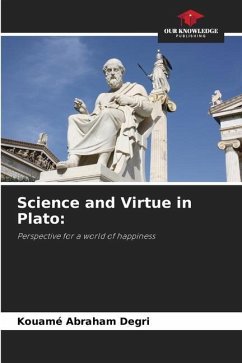In accordance with the ideal of the world they hope to see, many thinkers aim, among other things, at identifying the problems facing their society in order to apply the appropriate solutions. Plato, noting the difficulties which prevented the wellbeing of his fellow-citizens, proposes them the science of the virtues whose object aimed at predisposing the Athenians to the necessary practice of the good as well in words as in acts, pledge of the life of happiness. He remained persuaded that the daily suffering of his compatriots similar to that of the current societies, was essentially consecutive to the bad conduct of the citizens obnubilated by the all azimuths search of material gains. The science of the Good according to Plato, by its virtues of courage, temperance, justice and wisdom, has for positive effect to divest the human being of all the vices that one recognizes to him commonly to the point to mute him in a benevolent being. It is a knowledge of ideal type allowing the knowing person to transcend the evanescent truths to reach the atemporal realities, generators of the universal values.
Bitte wählen Sie Ihr Anliegen aus.
Rechnungen
Retourenschein anfordern
Bestellstatus
Storno








